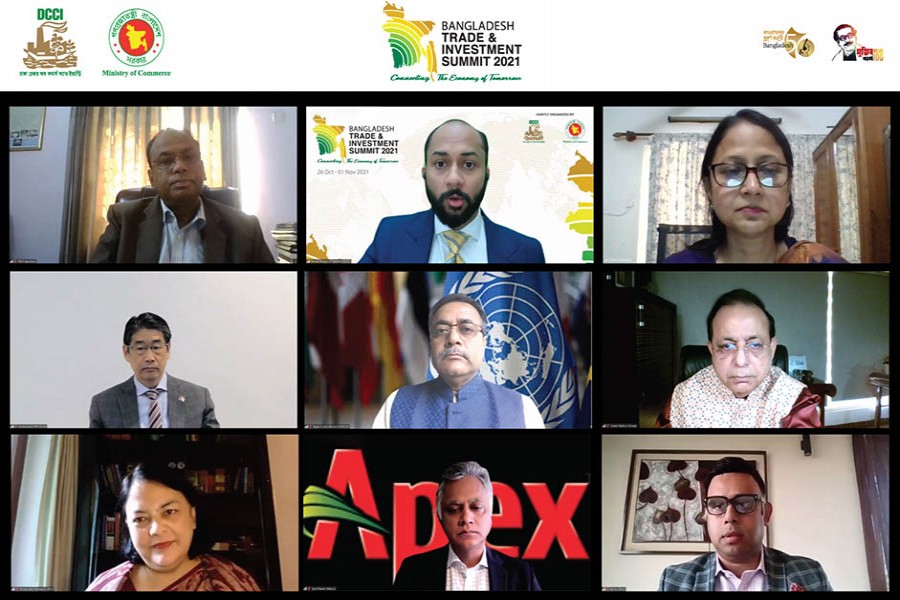Blessed with its location in the world’s most vibrant region, Bangladesh is required to implement reform policies fast to break into Asia-Pacific markets and attract investment from the neighbourhood, suggest business leaders.
At a virtual gathering on Friday, they listed a set of immediate measures such as reforms, product and market diversification, simplification of business process, competitive tax and tariff regime and building smart infrastructures to harness the region’s economic potentials.
“We need to look towards Asia (and the Pacific) for attracting investment,” Syed Nasim Manzur, Managing Director, Apex Footwear Ltd, told the webinar on “Asia & Pacific and Bangladesh: Harnessing Economic Potentials”, organised on the 4th day of Bangladesh Trade & Investment Summit 2021, by the Ministry of Commerce and Dhaka Chamber of Commerce and Industry (DCCI).
He recommended an overhaul of the National Board of Revenue, faster implementation of policies, and improvement of infrastructures such as airports and national airlines to ensure Bangladesh’s long-term prosperity.
Japanese Ambassador to Bangladesh Ito Naoki said lack of infrastructure is a bottleneck for investment but it would no more be a problem for Bangladesh in the next five years, referring to some development projects including Japan Economic Zone in Araihazar near Dhaka.
Emphasising the need for reforms to enhance the country’s global image that changes perception, he said Bangladesh needs to address the investment climate.
President of Metropolitan Chamber of Commerce and Industry (MCCI) Nihad Kabir, while explaining foreign investors’ perspective, said dispute resolution process, approval of business proposals and taxation remain some of their key concerns.
“We need not shy away from signing FTA (free trade agreement),” she said of how the country could face the potential challenges in the coming days.
In this context, the business leader underlined the importance of quality education and improved healthcare facilities with standard research capacity.
Addressing as chief guest at the discussion, Md. Tofazzel Hossain Miah, Secretary at the Prime Minister’s Office, said Bangladesh has attained commendable progress in many areas and the country’s LDC (least developed country) graduation process is a sign of strength and resilience despite challenges.
He mentioned that the government is working hard to strategically address the challenges of the post-LDC period and make the transformation sustainable.
Secretary of the Economic Relations Division, the Ministry of Finance, Fatima Yasmin said Bangladesh is going in the right direction and the government is investing almost US$40 billion in the mega infrastructure sector alone.
She, however, maintained that policy reforms are a continuous process to facilitate businesses.
On FTA, she said Bangladesh is in discussion with 10 countries for signing PTA (preferential trade agreement) or FTA and two such agreements would be signed soon.
DCCI President Rizwan Rahman, in a power-point presentation, said Bangladesh’s bilateral trade with the Asia-Pacific region hovers around $36 billion.
“It is the third-largest export destination of Bangladesh but Bangladesh does not have any PTA and FTA with Asia and Pacific member countries,” he added.
He said more bilateral and multilateral agreements should be struck to tap the untapped markets of the Asian countries.
Dwelling on the prospects of the Asia and Pacific region, Syed Nasim Manzur cited the example of the leather sector, saying that six out of 10 top global footwear markets are now in Asia.
Abdul Matlub Ahmad, Chairman of Nitol Niloy Group, said there are a lot of business opportunities in the Asia Pacific region. “Now we need partners and global value chain…Bangladesh can be a good investment destination for Asian countries.”
Referring to Bangladesh main exportable item of RMG, Dr Rajan Sudesh Ratna of UNESCAP said over-dependence on a specific product or specific market is not good for any economy.
He suggested process simplification to start a new business, improving ease of doing business and easy certification process.
Dr Masrur Reaz, Chairman of Policy Exchange of Bangladesh, said 50 per cent of the global GDP will come from the Asia Pacific region by 2040.
“What Bangladesh now needs to do is to be strategic for future plan on trade and investment… It needs a faster process to reap the benefits of Asia’s economic advancement,” he added.


